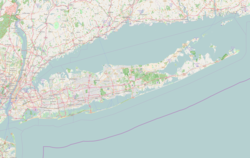History
The Long Island Rail Road established the Medford station in 1843 in a flat wilderness in the Long Island Central Pine Barrens. The station connected to the Patchogue Stage Road between Patchogue and Port Jefferson, and a post office was established. [2]
In 1907 the LIRR established the Medford Prosperity Farm (officially called Experimental Station #2) on 80 acres (320,000 m2) to show that crops could be raised in the Pine Barrens. Theodore Roosevelt visited the station in August 1910. As the car drove across a trail between Medford and Wading River, it got stuck in the mud and Roosevelt was said to take a "flying leap" to get out. [2]
By the mid-to-late-20th century, developers were building new neighborhoods within Medford. Eagle Estates was built along Horse Block Road east of NY 112 in 1963, although it was planned as far back as the 1930s. The development included a Blue Jay Market shopping center on Horseblock Road west of Eagle Avenue, and a youth baseball and athletic field east of Sipp Avenue between Wave and Race avenues. The Long Island Expressway was built through Medford in 1970, with interchanges at New York State Route 112 and Horseblock Road, the latter of which is close to an older interchange with Horseblock Road and Long Island Avenue, and was not completed until 1999. The Pines was established in the 1970s east of Buffalo Avenue, south of Jamaica Avenue, north of Woodside Avenue and far west of Patchogue-Yaphank Road.
A segment of Peconic Avenue east of Buffalo Avenue has been lined with automotive junkyards since the mid-20th century.
Demographics
Historical population| Census | Pop. | Note | %± |
|---|
| 2020 | 24,247 | | — |
|---|
|
As of the census [6] of 2000, there were 21,985 people, 6,791 households, and 5,629 families residing in the CDP. The population density was 2,088.5 inhabitants per square mile (806.4/km2). There were 6,939 housing units at an average density of 659.2 per square mile (254.5/km2). The racial makeup of the CDP was 89.18% White, 3.98% African American, 0.25% Native American, 1.38% Asian, 0.02% Pacific Islander, 3.11% from other races, and 2.07% from two or more races. Hispanic or Latino of any race were 10.79% of the population.
There were 6,791 households, out of which 42.6% had children under the age of 18 living with them, 68.2% were married couples living together, 10.7% had a female householder with no husband present, and 17.1% were non-families. 13.2% of all households were made up of individuals, and 5.2% had someone living alone who was 65 years of age or older. The average household size was 3.23 and the average family size was 3.52.
In the CDP, the population was spread out, with 27.7% under the age of 18, 8.9% from 18 to 24, 30.9% from 25 to 44, 24.7% from 45 to 64, and 7.8% who were 65 years of age or older. The median age was 35 years. For every 100 females, there were 96.8 males. For every 100 females age 18 and over, there were 94.7 males.
The median income for a household in the CDP was $67,153, and the median income for a family was $70,493. Males had a median income of $46,485 versus $30,427 for females. The per capita income for the CDP was $22,579. About 1.5% of families and 3.3% of the population were below the poverty threshold, including 3.5% of those under age 18 and 4.4% of those age 65 or over.
This page is based on this
Wikipedia article Text is available under the
CC BY-SA 4.0 license; additional terms may apply.
Images, videos and audio are available under their respective licenses.



